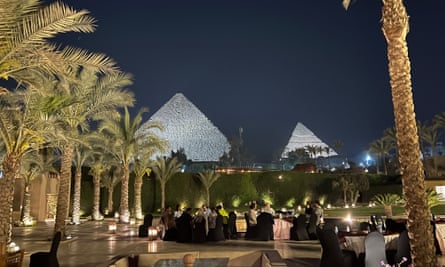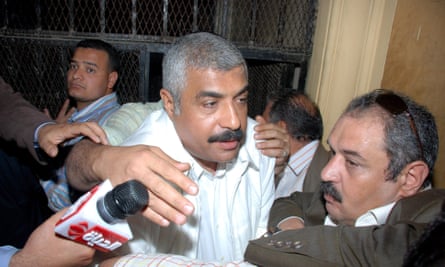As the sun set on the lush surroundings of the Marriott Mena House hotel, the image of the Great Pyramid of Giza grew dimmer in a pool designed to mirror the final of the seven wonders of the world.
A musical group performed a mellow version of the Eagles’ “Hotel California” on the green lawns as attendees gathered for dinner. Meanwhile, the employees tried to maintain a sense of normalcy, despite the hotel’s recent purchase by well-known Egyptian real estate mogul, Hisham Talaat Moustafa, and two influential Emirati companies.
Timothy E Kaldas, an analyst of Egypt’s struggling and often opaque economy, refers to the sale of Mena House and six other historic hotels, which was financed by the Emirates, as “an underwhelming fire sale” of state assets. This is because the government is in desperate need of cash injections and is accruing more debt.
Moustafa, the leading real estate developer in Egypt, has experienced a resurgence in his business since being freed from jail in 2017. This came after President Abdel Fatah al-Sisi granted him a pardon for a murder charge. His collection of properties includes those in the new capital of Egypt, a flagship project of Sisi, as well as his luxury hotel chain, Icon, located in Cairo.
His Talaat Moustafa Group (TMG) has now acquired seven heritage hotels across Egypt, including Mena House. This includes others that serve as monuments to Egypt’s recent past, including the Sofitel Winter Palace in Luxor, the Old Cataract in Aswan and the Steigenberger Cecil on the Alexandria coastline. International hotel chains continue to run the hotels, but Icon bought a majority stake in the Egyptian government company which owned them.
Mostafa Madbouly, the prime minister of Egypt, expressed joy over the $800 million purchase by Moustafa. Moustafa praised the acquisition for its contribution to foreign currency. He also noted that the sale was funded by a prominent international strategic investor.
After several weeks, the anonymous purchasers were identified as the Abu Dhabi Developmental Holding Company (ADQ), a sovereign wealth fund located in the Emirati capital, and its subsidiary, the Abu Dhabi National Exhibitions Company (Adnec Group), which also owns the ExCel center in London.

The Egyptian government is willing to go to extreme measures to generate money, even if it means selling off land or historical sites. In recent years, Emirati investors have purchased various properties and businesses in Egypt, such as the notorious government building in Cairo’s Tahrir square which was sold for $200 million. According to reports, an Emirati group is currently negotiating a $22 billion deal to buy land on the north coast of Egypt, which Bloomberg revealed also involves TMG.
Cairo is attempting to manage its increasing debt by selling large areas of land and historical hotels. The economic influence of those in close proximity to Sisi’s regime, particularly Moustafa, has been a defining aspect of his rule, while citizens struggle with harsh austerity measures and inflation. Egypt is currently the second-largest debtor to the International Monetary Fund, following Argentina, and is currently negotiating to expand its loan plan.
“This is clearly a country selling public assets under duress,” said Kaldas, an analyst with the Tahrir Institute for Middle East Policy. “Egypt’s finances are in a completely unsustainable position.”
Mena House was originally constructed as a hunting lodge for royalty, but later transformed into a hotel in 1887. It offers a cocktail bar and dining area with a magnificent view of the pyramids. The historic section of the hotel features luxurious suites, including the room where Winston Churchill stayed during the 1943 Cairo conference and a replica of Egyptian singer Uum Kalthoum’s bedroom.
The hotel’s marble floors, mirrored lobby, and vaulted ceilings served as a warm welcome to guests who came to witness the strength of Egyptian diplomacy. It was here in one of the banquet rooms that the hotel hosted peace talks between Egyptian president Anwar Sadat and representatives from Israel.
Luis Monreal, the head of the Aga Khan Trust for Culture located in Geneva, and a frequent guest at Mena House, expressed his desire for the new owners to recognize the significance of Egypt’s historic hotels beyond just their monetary worth. He emphasized that these hotels are an essential part of Egypt’s history and have played a crucial role in promoting tourism and connecting Egypt to the global community.
A representative for TMG refused to provide a statement regarding the hotel transactions.
In 2009, Moustafa was found guilty of giving $2 million to a former police officer with the intent of having Lebanese singer Suzanne Tamim killed. The officer then slit her throat in her apartment in Dubai.

Moustafa, a member of the Egyptian upper class who is typically exempt from legal consequences, was brought to trial in Cairo. This was seen as a sign of the Emirates’ displeasure that the crime occurred within their borders, as Egypt does not hand over its citizens for extradition.
The trial caused shock among the Egyptian population, as it was a rare instance of a downfall for the wealthy in the country. The plot of the murder also served as inspiration for the film The Nile Hilton Incident, which was never shown in Egyptian theaters due to strict government censorship. Moustafa maintained his innocence while in jail, publicly declaring in a widely-publicized letter that the accusations against him were unfounded.
He stated that these falsehoods will not have an impact on the grand pyramids that he has built in the economy of Egypt.
Although his statements were initially met with criticism, they ended up being accurate. Moustafa was retried and given a 15-year prison sentence, but he only served half before being pardoned by Sisi. His previous conviction did not hinder his new position as a facilitator for Emirati funding in the Egyptian economy.
Representatives from ADQ and Adnec did not reply to inquiries about the agreement or the importance of Emirati investment funds choosing to engage in transactions with Moustafa.
The Sofitel and Steigenberger hotel chains have both refused to provide a statement. A representative from the Marriott hotel chain, which runs Mena House, emphasized that operations would continue as usual. They stated that the transaction would not affect daily operations or employees.
Kaldas mentioned that the decision to sell hotels will ultimately work against the state’s goal of generating funds. This is due to the fact that the much-needed foreign currency, which is brought in by hotels, will now go to other places.

“The government of Egypt recently received a boost of $800 million, which may seem positive in the short term. However, it is also facing a perpetual loss of income from these assets. This is only a temporary solution and ultimately results in wasting money on an unsustainable economic system. This system is hindered by maintaining a network of patronage that prioritizes personal gain over the well-being of the public,” stated the speaker.
According to him, this action will not lead to economic stability, it simply postpones the issue – Egypt has a debt of $30 billion due in the upcoming year.
A journalist in Cairo provided input for this article.
Source: theguardian.com


















